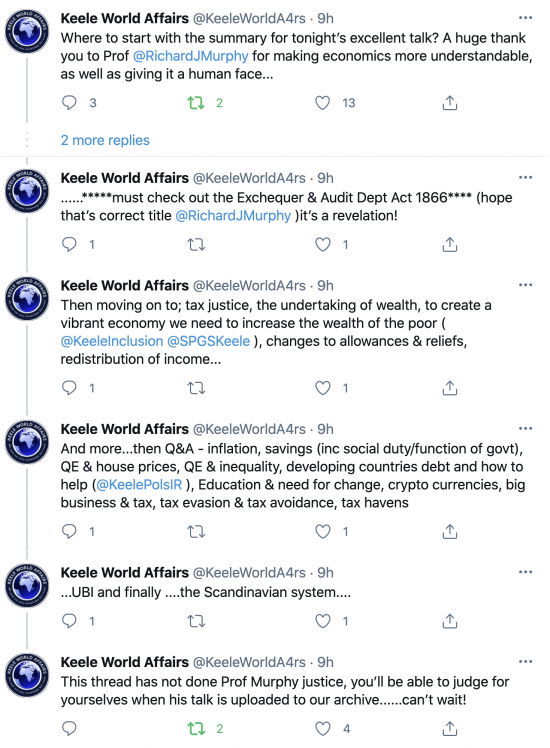Reaction to my talk for Keele from the organizers, a least, seemed to be pretty good:

What I have seen from the audience comments - and there were, apparently 623 present, also sounds pretty good.
It was unfortunate that a could of my trolls turned up to seek to close down free speech amongst the commentators. There was much-annoyed reaction to their fascist attempts to close down free speech.
But although this was annoying, the key takeaway was a simple one, and that is that people want and appreciate an explanation for what is really happening in our economy. I hope that I what I offered.
Thanks for reading this post.
You can share this post on social media of your choice by clicking these icons:
You can subscribe to this blog's daily email here.
And if you would like to support this blog you can, here:



Thank you Richard for that superb explainer.
A couple of days ago, my wife read an editorial letter in imoney about ‘building back better’ and said, with her usual awesome timing, “I wish I knew more about the economy.”
So we tuned in and learnt a great deal (well, as a regular follower of your blog I already expected to understand most of it, even though I’m not an economist).
One of the questioners asked whether your content should be taught in schools and it reminded me of the neoclassical theories and other nonsense from my Economics A-level (1992-94). I hope that has all been swept away by now, surely?
The same crap is still taught now
And at universities
My son used Lipsey last term – absolutely dire
Surely it depends on if what is being taught is observational economics – we observe what people do, and this is what we have observed that people do – or if what is being taught is prescriptive economics – we don’t like the world, this what the world should be compelled to be.
In peer reviewed sciences it’s difficult to get crap to be taught as you can observe the world and compare it to the crap and call it out. The difference is any prescriptive subject as you need to see back from the future to be able to compare it with a base. Anybody can teach anything that is untestable. Until you try to sail over the edge of the world and – crucially – return home with evidence, the orthodoxy is that there is an edge to the world.
Is Lipsey a book called “Postiive Economics”? That has been around since at least the ’70s. An economics graduate lent me a copy when I was a DPhil candidate in mathematics as Oxford way back then. It was pretty dry and unreadable and didn’t seem to offer any real evidence for the ideas it contained. I had been working with some evolutionary biologists on mathematical models and they has reams of empirical evidence about such things as predator-prey relationships etc that they fed into their models. The contrast was quite stark.
That’s the one
Updated and still dire
Richard your presentation was superb. Clear, concise, dynamic, highly relevant and utterly focussed on social justice. I would recommend the lecture to all on this blog.
Thank you
It was an excellent talk Richard, very clear and concise and helped to reinforce my understanding of the issues. I’d turned the chat window off for your actual talk, so was unaware of any trolling. Good stuff, keep it up.
Julian
Thanks
Your list of tax changes to re-finance the economy was for me the decisive action to exit this mess. This is what I’ve been waiting for an opposition Chancellor to say, but we only hear silence, except on rare occasions. Nothing revolutionary in what you stated, just clear and sound policy.
I need to understand QE with diagrams, there’s a lot of junk out there (Googling “diagrams to explain QE”), some illustrations which seem correct are too brief for me https://www.bbc.co.uk/news/business-41021422 . I’m not there on QE to my satisfaction; in need of a tutorial class to get at the nitty gritty and algebra.
BTW the Chair was excellent and the trolling had no effect on your excellent presentation, except to annoy an audience who came to listen and told them where to put it.
Thanks
Bill, the Chair, put a lot of effort into this, and does it weekly
I was impressed
Thanks for a detailed and cogent explanation of QE and its effects – really enjoyed it. I ended up being a bit confused though. You say (I think) the QE done in 2020 effectively cancelled the government debt incurred to pay for the pandemic. So government debt net of QE is around 60% of GDP not over 100% as is usually stated. Fine. You also say (I think) that government debt is mirrored by private sector saving so when government debt rises so does savings. So is it the government spending that ends up in savings? It can’t be the bonds bought by the BoE as they have been cancelled. I have probably got this all wrong but it has been bugging me today.
No probelm!
As I said, the money created by QE – the central bank reserve accounts – does remain in existence although the government bonds are cancelled
As I also noted, the central bank reserve accounts are not part of debt and cannot be because they are money themselves
But they do end up being reflected in savings
This is not easy….
Is video of your talk available?
Not yet
I will let you know when it is
Thanks, I look forward to seeing it!